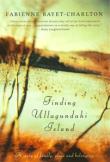
Latest Issues
AbstractHistoryArchive Description
Notes
-
The pre-publication title for this work was Looking for Ulagundahi Island. The pre-publication title was in use when the 2000 David Unaipon Award was announced.
Publication Details of Only Known VersionEarliest 2 Known Versions of
Works about this Work
-
The Poetics of (Re)Mapping Archives : Memory in the Blood
2014
single work
criticism
— Appears in: JASAL , vol. 14 no. 3 2014;'This paper explores stories of re-mapping the archives through art and poetic-prose, using ideas of haunting through ‘memory in the blood.’ Our family archives are like maps that haunt and guide us toward paths past-travelled and directions unknown. We travel through these archives that offer up new stories and collections of data, and a brutal surveillance is exposed at the hands of the State. We gain insight into intimate conversations, letters, behaviours and movements, juxtaposed with categorisations of people, places, landscapes and objects. These records are our memories and lives; material, visceral, flesh and blood. The State wounds and our records bleed. I travel through my own Nanna’s records and recognise that we have never lived outside the State, and this very act of recognition continues the wounding. State acts of surveillance, recording and archiving had the power to place our
family stories in the public domain, or obliterate stories within a broader history of erasure; filed away, silent and hidden until bidden. But our bodies too are archives where memories, stories, and lived experiences are stored, etched and anchored in our bloodlines deep. They ground our creativity in what become personal and political acts of remembering, identity making and speaking back to the State. Detective-like methods allow us to creatively re-map events and landscapes, piece together lives fragmented and heal our wounds.' ((Re) Mapping the Archive, 4)
-
One Man's History Is Another Woman's Lie
2003
single work
review
— Appears in: Australian Humanities Review , October no. 30 2003;
— Review of Finding Ullagundahi Island 2001 single work novel ; A Little Bird Told Me : Family Secrets, Necessary Lies 2002 single work biography -
Heady Memoir
2003
single work
review
— Appears in: Dotlit : The Online Journal of Creative Writing , August vol. 4 no. 1 2003;
— Review of Finding Ullagundahi Island 2001 single work novel -
Untitled
2002
single work
review
— Appears in: Muse , September no. 221 2002; (p. 13-14)
— Review of Finding Ullagundahi Island 2001 single work novel -
Untitled
2002
single work
review
— Appears in: Viewpoint : On Books for Young Adults , Winter vol. 10 no. 2 2002; (p. 42)
— Review of Finding Ullagundahi Island 2001 single work novel
-
Heady Memoir
2003
single work
review
— Appears in: Dotlit : The Online Journal of Creative Writing , August vol. 4 no. 1 2003;
— Review of Finding Ullagundahi Island 2001 single work novel -
One Man's History Is Another Woman's Lie
2003
single work
review
— Appears in: Australian Humanities Review , October no. 30 2003;
— Review of Finding Ullagundahi Island 2001 single work novel ; A Little Bird Told Me : Family Secrets, Necessary Lies 2002 single work biography -
Paperbacks
2002
single work
review
— Appears in: Canberra Sunday Times , 17 February 2002; (p. 51)
— Review of Machines for Feeling 2001 single work novel ; Regret 2002 single work novel ; Follow the Rabbit-Proof Fence 1996 single work biography ; Finding Ullagundahi Island 2001 single work novel -
Traversing the Personal
2002
single work
review
— Appears in: Australian Book Review , March no. 239 2002; (p. 33-34)
— Review of Finding Ullagundahi Island 2001 single work novel ; Follow the Rabbit-Proof Fence 1996 single work biography ; Full Circle : From Mission to Community : A Family Story 2001 single work autobiography -
In Short
2002
single work
review
— Appears in: The Sydney Morning Herald , 16-17 March 2002; (p. 15)
— Review of Finding Ullagundahi Island 2001 single work novel -
An Island in the Stream
2002
single work
biography
— Appears in: The Sunday Age , 17 February 2002; (p. 10) -
The Poetics of (Re)Mapping Archives : Memory in the Blood
2014
single work
criticism
— Appears in: JASAL , vol. 14 no. 3 2014;'This paper explores stories of re-mapping the archives through art and poetic-prose, using ideas of haunting through ‘memory in the blood.’ Our family archives are like maps that haunt and guide us toward paths past-travelled and directions unknown. We travel through these archives that offer up new stories and collections of data, and a brutal surveillance is exposed at the hands of the State. We gain insight into intimate conversations, letters, behaviours and movements, juxtaposed with categorisations of people, places, landscapes and objects. These records are our memories and lives; material, visceral, flesh and blood. The State wounds and our records bleed. I travel through my own Nanna’s records and recognise that we have never lived outside the State, and this very act of recognition continues the wounding. State acts of surveillance, recording and archiving had the power to place our
family stories in the public domain, or obliterate stories within a broader history of erasure; filed away, silent and hidden until bidden. But our bodies too are archives where memories, stories, and lived experiences are stored, etched and anchored in our bloodlines deep. They ground our creativity in what become personal and political acts of remembering, identity making and speaking back to the State. Detective-like methods allow us to creatively re-map events and landscapes, piece together lives fragmented and heal our wounds.' ((Re) Mapping the Archive, 4)
Awards
- Coober Pedy, Far North South Australia, South Australia,
- Grafton - Maclean area, Mid North Coast, New South Wales,



